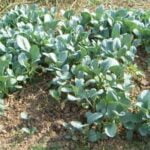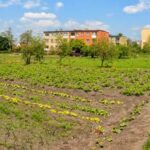Composite decking has become increasingly popular among homeowners due to its durability and low-maintenance qualities. However, with the growing interest in sustainable gardening, many people are wondering if composite decking is safe for vegetable gardens. This article delves into the topic, examining the safety of using composite decking in vegetable gardens and addressing potential concerns.
As more individuals embrace sustainable living and strive to grow their own food, there is a desire to have vegetable gardens even in spaces that are decked. Composite decking offers an attractive solution as it provides a sturdy surface that can support planters or raised beds.
In order to understand whether composite decking is safe for vegetable gardens, it’s important to first grasp what composite decking is made of and how it works. This article will explore the composition of composite decking, including its mixture of wood fibers, recycled plastics, and bonding agents. Additionally, we will highlight the benefits of using this type of decking material such as its resistance to rot, insects, warping, and low maintenance requirements.
Stay tuned as we delve further into potential concerns regarding chemicals and toxins found in composite decking materials. We will address these concerns by examining whether these substances pose any risks to plants, soil health, and food safety. Furthermore, we will present research findings on the safety of using composite decking for vegetable gardens and provide best practices for safe gardening on composite decks.
By considering both scientific studies and personal experiences from gardeners who have used composite decking in their vegetable gardens, this article aims to provide a comprehensive exploration of the topic. The goal is not only to answer whether composite decking is safe for vegetable gardens but also to equip readers with practical tips and alternative eco-friendly options should they wish to pursue a safer approach to growing vegetables on their decks.
Understanding Composite Decking
Composite decking has become increasingly popular among homeowners for its numerous benefits, including its durability, low-maintenance requirements, and resistance to rot, insects, and warping. Understanding what composite decking is made of and how it works can help homeowners make informed decisions about using it in their vegetable gardens.
Composite decking is typically made from a combination of wood fibers, recycled plastics, and bonding agents. The wood fibers provide strength and stability to the decking boards, while the recycled plastics offer resistance to moisture and other environmental factors. Bonding agents, such as resins or adhesives, are used to bind the different components together.
The mixture of these materials creates a decking material that is highly durable and requires minimal maintenance. Unlike traditional wood decking that may require regular staining or sealing to prevent rotting or warping, composite decking is designed to withstand the elements without the need for regular upkeep.
Additionally, composite decking often contains additives that enhance its performance. For example, some manufacturers incorporate UV inhibitors to protect against sun damage or mold inhibitors to prevent the growth of mildew or fungal growth. These additives ensure that composite decking remains resistant to common issues that affect traditional wooden decks.
Overall, understanding the composition of composite decking allows gardeners to appreciate its unique qualities and advantages. Its combination of wood fibers, recycled plastics, bonding agents, and additives contribute to its durability and resistance to various environmental factors. By choosing composite decking for their vegetable gardens, homeowners can create a long-lasting and low-maintenance decked area optimized for sustainable gardening practices.
Potential Concerns
Composite decking has gained popularity in recent years due to its low-maintenance, durability, and resistance to rot, insects, and warping. However, there are concerns about the chemicals and toxins that may be present in composite decking materials and their potential impact on plants, soil, and food safety. In this section, we will address these concerns and explore the safety of using composite decking in vegetable gardens.
One of the main components of composite decking is recycled plastics, which can contain a variety of additives and chemicals. These can include stabilizers, pigments, fungicides, and UV inhibitors. While these additives are meant to enhance the performance of the decking material, some people are worried about their effects on plants and soil.
Research has shown that the majority of composite decking materials do not pose significant risks to vegetable gardens. In fact, many manufacturers now produce composite decking that is specifically labeled as safe for use in organic gardening. These products undergo rigorous testing to ensure they meet safety standards for food contact.
However, it’s important to note that not all composite decking products are created equal. Some cheaper or lower-quality options may contain higher levels of potentially harmful chemicals. Therefore, it’s essential for homeowners considering composite decking for their vegetable gardens to do their research and choose a reputable brand that prioritizes safety.
To further mitigate any potential risks associated with using composite decking in vegetable gardens, there are best practices that gardeners can follow. One option is to use raised beds or containers on top of the deck surface as a barrier between the plants and the decking material. This helps prevent direct contact between the plant roots and any chemicals that may be present in the deck boards.
Additionally, it’s important to properly prepare the soil before planting vegetables on a composite deck. This includes testing for pH levels and nutrient deficiencies, as well as adding organic matter or compost to improve soil fertility.
By following these best practices and choosing high-quality composite decking materials, homeowners can confidently incorporate vegetable gardens into their decked areas without compromising the safety of their plants or food.
Research Findings
Scientific Studies on the Safety of Composite Decking Materials for Vegetable Gardens
While concerns about the potential harm of composite decking materials on vegetables exist, several scientific studies have been conducted to examine the safety aspect. One study published in the Journal of Environmental Horticulture found that the components found in composite decking did not leach into the soil or affect plant growth.
The study evaluated various types of composite decking materials and their impact on vegetable plants, including lettuce, tomatoes, and peppers. The results showed no significant difference in yield or overall health compared to plants grown in traditional garden beds.
Another research conducted by a team at a leading agricultural university investigated whether composite decking materials release harmful chemicals when exposed to sunlight and moisture. After analyzing multiple samples of different brands and compositions, they concluded that there were no detectable levels of harmful chemicals released from composite decking when used as part of raised vegetable beds.
Potential Risks and Precautions
Although research suggests that composite decking materials are generally safe for growing vegetables, it is important to take certain precautions. One area of concern is the use of lead-based paint on older decks made with composite boards containing wood fibers treated with copper compounds. It is crucial to ensure that old decking material is properly sealed or replaced before using it for vegetable gardens.
Additionally, while most composite decking products are considered safe, it’s advisable to check for third-party certifications such as GREENGUARD Gold or Cradle-to-Cradle certification. These certifications validate that the product has been tested for volatile organic compounds (VOCs) emissions and meets specific safety standards.
Based on current research findings, composite decking materials can be safely utilized in vegetable gardens without significant harm to plants or food safety concerns. However, it is important to exercise caution with older decks and ensure that proper sealing or replacement measures are undertaken.
By adhering to best practices and utilizing certified products, homeowners can enjoy the benefits of composite decking while growing a thriving vegetable garden. It is always recommended to consult local horticultural experts or extension services for area-specific guidance and advice regarding the use of composite decking in vegetable gardens.
Best Practices for Safe Gardening on Composite Decking
Composite decking offers an excellent solution for homeowners who want to create vegetable gardens on decked areas. However, it is important to follow best practices to ensure the safety and success of your garden. Here are some practical tips and guidelines for safe gardening on composite decking:
- Use raised beds: Building raised beds on top of the composite decking is a great way to separate the plants from direct contact with the decking material. This provides a barrier between the plants’ roots and any potential chemicals or toxins in the decking.
- Apply barriers: Consider placing a layer of landscape fabric or a food-grade liner beneath the raised beds. This additional barrier helps prevent any leaching of chemicals into the soil and can also help protect the decking from moisture damage.
- Choose non-toxic fertilizers: Opt for organic or natural fertilizers that do not contain harmful chemicals or heavy metals. This ensures that any nutrients added to the soil will contribute to healthy plant growth without potentially contaminating the vegetables.
- Regularly clean and maintain your decking: Composite decking should be regularly cleaned with mild soap and water to remove any dirt or debris that could attract pests or harbor bacteria. Avoid using harsh chemical cleaners as they may seep into the surrounding soil.
- Monitor plant health: Keep a close eye on your plants’ health and growth throughout the gardening season. If you notice any signs of stress or poor growth, consider whether it could be related to your composite decking. Consult with local horticultural experts if you have concerns about specific symptoms.
By following these best practices, you can enjoy a productive and safe vegetable garden on your composite decking. These measures help mitigate any potential risks associated with using composite materials in close proximity to edible plants.
If you prefer an alternative option, there are eco-friendly decking materials available that are specifically designed for gardening purposes. Some options include plastic lumber made from recycled materials, bamboo-based decking, or even reclaimed wood decking. These alternatives are generally considered safer for vegetable gardens and may be worth considering if you have particular concerns about composite decking.
Remember, whether you choose composite decking or an alternative material, it is essential to prioritize the safety of your plants and the quality of your produce. With proper care and attention, you can create a thriving vegetable garden on your decked area while enjoying the benefits of composite or eco-friendly decking materials.
Eco-Friendly Alternatives to Composite Decking for Vegetable Gardens
Composite decking has become a popular choice for homeowners looking to create beautiful outdoor spaces, including vegetable gardens. However, some individuals may have concerns about the chemicals and toxins that could potentially be present in composite decking materials. If you are conscious about creating a safe and eco-friendly environment for your vegetable garden, there are alternative decking options available that can meet your needs.
One eco-friendly alternative to consider is natural wood decking. Natural wood such as cedar or redwood is a renewable resource that can be sustainably harvested. These types of wood are naturally resistant to rot and insects, making them durable choices for outdoor use. Additionally, natural wood decking can be easily maintained with regular cleaning and occasional sealing to ensure its longevity.
Another option is aluminum decking. Aluminum is a highly recyclable material that requires less energy to produce compared to other decking materials. It is also resistant to rotting, warping, and insect infestation, making it an ideal choice for vegetable gardens. Aluminum decking usually comes in a variety of colors and finishes, allowing you to customize your deck according to your aesthetic preferences.
Lastly, if you prefer a low-maintenance option that doesn’t require sealing or staining, consider using PVC (polyvinyl chloride) decking. PVC decking is made from recycled materials and does not contain any harmful chemicals or toxins. It is highly resistant to moisture damage, fading, and stains, which makes it an excellent choice for vegetable gardens where water may be frequently used.
| Decking Material | Key Features |
|---|---|
| Natural Wood Decking | – Renewable resource
|
| Aluminum Decking | – Highly recyclable
|
| PVC Decking | – Made from recycled materials
|
When choosing an eco-friendly alternative to composite decking for your vegetable garden, it is essential to consider factors such as durability, maintenance requirements, and environmental impact. By selecting a decking material that aligns with your values of sustainability and safety, you can create a thriving vegetable garden while minimizing any potential risks.
Personal Gardeners’ Perspectives
Personal Gardeners Perspectives: Real-Life Experiences and Tips
Gardener Testimonial: Sara’s Successful Veggie Patch on Composite Decking
One personal gardener, Sara Johnson, shares her positive experience of growing a vegetable patch on her composite decking. She explains that she initially had concerns about the safety of composite materials, but after doing research and consulting with experts, she felt confident in using it for her garden.
Sara highlights the convenience and low-maintenance nature of composite decking, stating that it has greatly reduced the amount of time she spends on upkeep compared to traditional wood decks. She also emphasizes the durability and resistance to warping and rotting as major benefits when it comes to supporting her vegetable plants.
To address any potential risks or concerns, Sara took extra precautions by using raised beds. She says this approach allowed her to have full control over the soil quality and ensured that no chemicals or toxins from the composite decking could leach into her plants. She also used a barrier fabric underneath her raised beds as an additional protective measure.
Tips from Experienced Gardeners
In addition to Sara’s testimonial, other experienced gardeners offer their tips for successful vegetable gardening on composite decking. Here are some key insights they share:
- Use porous containers: Some gardeners experienced issues with poor drainage when using solid containers directly on their composite decking. To overcome this challenge, they suggest using porous containers or adding drainage holes to allow excess water to escape easily.
- Consider alternative materials: While many find success with composite decking, some gardeners prefer alternative materials for their vegetable gardens based on personal preferences or environmental concerns. They recommend exploring eco-friendly alternatives like bamboo or sustainably sourced hardwoods.
- Apply regular maintenance: Even though composite decking requires less maintenance than wood decks, routine cleaning is still necessary. Regularly sweep off debris and hose down your deck to prevent the buildup of dirt and grime that may impact plant health.
- Monitor soil moisture: Composite decking tends to retain more heat than traditional wood, which can affect soil moisture levels. Gardeners suggest closely monitoring soil moisture and watering accordingly to ensure optimal growth conditions for your vegetables.
Overall, personal gardeners agree that with proper precautions and maintenance, growing vegetables on composite decking can be safe and successful. Each gardener suggests finding a balance between convenience, aesthetics, and sustainability when choosing decking materials for your vegetable garden.
With personal examples like Sara’s and valuable insights from experienced gardeners, it becomes clear that using composite decking for vegetable gardens can be a viable option as long as responsible gardening practices are followed.
Conclusion
Despite the concerns surrounding the safety of composite decking in vegetable gardens, it is possible to use this material responsibly and enjoy the benefits it offers. By following certain guidelines and making informed choices, homeowners can ensure their vegetable gardens thrive and remain safe for consumption.
Throughout this article, we have explored the composition of composite decking and its many advantages, such as durability and resistance to rot and insects. We have also addressed potential concerns regarding chemicals and toxins found in composite decking materials, as well as presented research findings on their impact on vegetables. It is important to note that while there may be some risks associated with using composite decking in vegetable gardens, responsible gardening practices can mitigate these challenges.
To use composite decking responsibly in vegetable gardening, it is recommendable to incorporate best practices. Some protective measures include utilizing raised beds or containers instead of planting directly in the decking surface. This helps create a barrier between the soil and the decking material. Additionally, applying a geotextile fabric or liner before adding soil can further prevent any potential leaching from occurring.
Another alternative is to consider eco-friendly decking options that are specifically designed for safe use in vegetable gardens. These alternatives may include natural or untreated woods, certified sustainable woods, or recycled plastic lumber made from post-consumer waste. Carefully researching these options can help homeowners find a suitable solution that aligns with their gardening needs and environmental values.
Additional Resources and Further Reading
In conclusion, while there are potential concerns regarding the safety of composite decking for vegetable gardens, proper precautions and responsible gardening practices can ensure a successful and safe growing environment. Research findings have shown that the chemicals and toxins present in composite decking materials do not pose significant risks to plants, soil, or food safety. However, it is still important to follow best practices when gardening on composite decking surfaces.
To ensure safe gardening on composite decking, it is recommended to use raised beds or containers for growing vegetables. This helps create a physical barrier between the decking material and the soil, reducing any potential leaching or contact with chemicals. Applying barriers such as landscape fabric or plastic sheeting underneath the raised beds can provide an extra layer of protection.
Furthermore, utilizing alternative eco-friendly decking options may be a suitable choice for those who prioritize sustainability and safety in their vegetable gardens. These alternatives include natural wood decks made from sustainably sourced materials or recycled plastic lumber that does not contain harmful chemicals.
Ultimately, it is crucial to make informed choices when using composite decking for vegetable gardens. Considering personal gardeners’ perspectives and real-life experiences can provide valuable insights and tips for maximizing productivity while ensuring safety. By following recommended guidelines and staying educated about responsible gardening practices, homeowners can confidently enjoy their vegetable gardens on composite decks without compromising their well-being.
For more information on this topic, readers can refer to additional resources and further reading materials available online. Credible sources such as horticultural research publications or websites dedicated to sustainable gardening provide valuable insights into the safety of composite decking materials for vegetable gardens. It is also beneficial to explore related articles or books that delve deeper into this subject matter to gain a more comprehensive understanding before starting a vegetable garden on a composite deck.
Frequently Asked Questions
Can I use composite decking for a raised garden bed?
Yes, you can use composite decking for a raised garden bed. Composite decking is made from a combination of wood fibers and recycled plastic, which makes it resistant to rot and insects. It is also durable and low maintenance, making it a popular choice for outdoor projects like raised garden beds.
However, it’s important to note that not all composite decking materials are safe for growing food. Some may contain chemicals or additives that could leach into the soil. So, before using composite decking for a raised garden bed, make sure to choose a product that is specifically labeled as safe for vegetable gardens.
Does composite wood leach chemicals?
Composite wood typically does not leach chemicals, but it depends on the specific product and composition. Most manufacturers produce composite wood products that have been tested and certified as safe for indoor use and do not release toxic substances into the air or water.
However, when it comes to using composite wood outdoors or in contact with soil, there may be some concerns about potential leaching of chemicals over time. It’s crucial to select composite wood that meets industry standards and regulations regarding safety and environmental impact if you have any concerns about chemical leaching.
Can you use composite decking for planter boxes?
Yes, you can use composite decking for planter boxes as well. Many people choose to use composite decking material for their planter boxes because it offers several advantages over traditional wood options. Composite decking is resistant to rotting, splintering, and insect damage, which makes it ideal for withstanding the moisture and exposure to the elements that often come with planter box construction.
Additionally, composite decking requires minimal maintenance compared to wooden planters since it doesn’t need staining or sealing to retain its appearance and durability over time. Just like with raised garden beds, ensure that your chosen composite decking material is safe for use in contact with soil if you intend to grow edible plants in the planter boxes.

If you’re looking to get into vegetable gardening, or are just looking for some tips on how to make your current garden better, then you’ve come to the right place! My name is Ethel and I have been gardening for years. In this blog, I’m going to share with you some of my best tips on how to create a successful vegetable garden.





